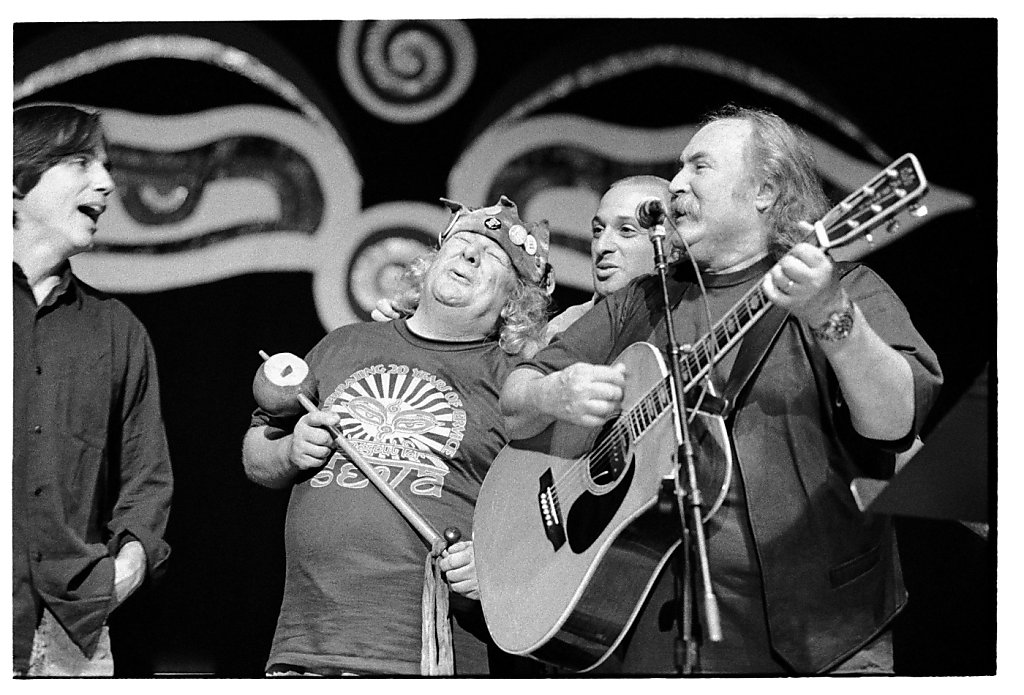By Chlotrudis Independent Film Society
Rating: 3 cats
Director: Michelle Esrick

Country: united_states
Year: 2010
Running time: 87
IMDB: http://www.imdb.com/title/tt1326259/
Jason says: “Can I be honest about something? I can’t warm up to hippies, or counterculture. In the abstract, I am all for a philosophy of living your life any way you want so long as you don’t hurt anyone else, but in practice, I get suspicious. So, as you might imagine, I wound up at a screening of a documentary on Wavy Gravy that was packed with his fans not because of any particular interest on my part, but because I cut it too close on another screening and it was the only thing that fit my schedule. I can’t say it particularly changed my view; when it ended, I had gained some respect for the man, though not much affection.
“Because of that, the film perhaps might consider itself a failure with me – I often got the vibe that it wasn’t enough for the audience to know about the man and his accomplishments. Filmmaker Michelle Esrick wants us to love him, and short of that, at least admire him. I’m hesitant to call what she presents a slanted take on the man, because there’s a good chance that he is just what he appears to be, no more and no less, a pure soul who has never done anything worse than give his son an embarrassing name. If that’s the case, though, she doesn’t have to make such a point of it. We don’t need people addressing the camera telling us how great he is.
“There’s also something a little off about the film at times. Take an early scene, where Wavy enters a room filled with various religious and spiritual symbols, and prays to be ‘the best Wavy Gravy I can be.’ I don’t doubt that this is a regular ritual for him, or that he’s less than sincere (although it’s the sort of deliberately pantheistic activity that can seem more calculated than heartfelt). It just feels semi-staged, like Esrick knew her subject well enough to get exactly what she wanted from any scene. It’s not quite like she was shooting from a screenplay, but there’s not a single moment in the film that feels like it surprised the filmmaker. The end result is that although I learned things from watching the movie, I rarely had the excitement of discovery.
“That may be too much to ask from a documentary about a man who has lived as long in the public eye as Wavy has, and filled much of that time with charitable endeavors. We get a bio of the man, using copious archive footage and photography, from his time as Hugh Romney, a New York poet whose work evolved into monologues before he headed west to be part of the group that would evolve into the Hog Farmers commune. Then it’s back east to Woodstock, before getting into Wavy’s decision to become a clown (police are less likely to beat clowns than hippies, apparently). From there, we learn about the man’s charity endeavors that continue to the present day: A road trip from London to Pakistan to deliver humanitarian aid (in actuality, mostly an awareness-raising trip), the Camp Wannarainbow clown camp he operates for troubled kids, and SEVA, an organization which has raised money and used it for cataract surgery in India, Nepal, Tibet, and other areas.
“This is all good stuff to hear about, and Ersick does a fine job piecing it together, showing how Wavy’s work benefits people, especially SEVA. For all that some of the other parts of the movie may seem like taking something nice and trying to present it as great, this is fantastic work, and also contains the most truly emotional parts of the film, when Wavy actually gets a chance to see what he’s been raising money for after years of refusing to use money that could help people to feed his ego.
“Indeed, that sequence makes me feel a little guilty about how I didn’t quite come to love the guy. There are plenty of other entertaining bits – the ‘Vote for Nobody’ campaign is especially funny when all the relevant puns are compressed into a five minute segment, for instance. The end credits contain a pretty darn amazing all-star cover of Wavy’s song “Basic Human Needs”. And in between, there are good stories told and good deeds chronicled.
“If you’re a fan, you’ll love this movie; plenty of other folks in the screening couldn’t contain how much they enjoyed it. I’m not sure how it would play to audiences that weren’t quite so sold ahead of time. You’d have to be a little heartless to come out of it sour, but it’s far from being as good as a movie as its subject is good as a person. 3 cats
“Seen 21 March 2009 at the Austin Convention Center (SXSW Special Screenings)”
